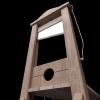Seattle is known as a place where the rain never stops, but lately it's been snowing, and the roads have been icy. On Friday the result, as the Seattle Post-Intelligencer reported, was a near-disaster:
Two Northwestern Trailways buses slid down the snow-covered cobblestones of East Thomas on Capitol Hill and smashed into each other, careening through a guardrail on Melrose Avenue East, 20 to 30 feet above Interstate 5.
Fortunately, the buses did not fall onto the highway below. They "came to rest with their front ends hanging over I-5."
It turns out there's a reason Seattle's roads are so icy. Today's Seattle Times reports:
There's snow and ice left on major arterials by design.
"We're trying to create a hard-packed surface," said Alex Wiggins, chief of staff for the Seattle Department of Transportation. "It doesn't look like anything you'd find in Chicago or New York." . . .
The icy streets are the result of Seattle's refusal to use salt, an effective ice-buster used by the state Department of Transportation and cities accustomed to dealing with heavy winter snows.
"If we were using salt, you'd see patches of bare road because salt is very effective," Wiggins said. "We decided not to utilize salt because it's not a healthy addition to Puget Sound."
Puget Sound is a saltwater estuary. That's right--Seattle officials are making their roads more dangerous because they're trying to keep salt out of the ocean.
http://online.wsj.co...6784530789.html

Seattle passes the salt
Started by
stocks
, Dec 24 2008 10:03 AM
1 reply to this topic
#1

Posted 24 December 2008 - 10:03 AM
-- -
Defenders of the status quo are always stronger than reformers seeking change,
UNTIL the status quo self-destructs from its own corruption, and the reformers are free to build on its ashes.
Defenders of the status quo are always stronger than reformers seeking change,
UNTIL the status quo self-destructs from its own corruption, and the reformers are free to build on its ashes.
#2

Posted 27 December 2008 - 10:46 AM
Sand — one of Seattle's main weapons against icy streets — is more likely to harm aquatic life than the salt the city refuses to use out of concern for its environmental effects.
That's the opinion of scientists who have studied the issue and officials from other cities that use salt to clear icy roads.
Professor Wilfrid Nixon, a winter-highway-maintenance expert at the University of Iowa College of Engineering, said salt is the best ice-buster around and that using it should be weighed against the environmental costs of other measures.
Plows burn more fuel when they have to plow more, and accidents caused by icy roads have environmental consequences, too, he said.
"Every crash in the winter is an environmental disaster," Nixon said. "You have spills of engine oil, gas, coolant. ...
http://seattletimes....6_roads24m.html
SPOKANE COUNTY, Wash. - On Christmas Eve, Gov. Chris Gregoire proclaimed a state of emergency in Washington due to the state's ongoing series of winter weather and storms.
Gregoire notes snowfall has reached record or near-record level in 30 of Washington's 39 counties.
May '07: Gregoire signs climate change measure into law
OLYMPIA, Wash. (AP) - Gov. Chris Gregoire has given final approval to a law aimed at curbing greenhouse emissions, saying Washington state is committed to tackling climate change.
Gregoire said the new law means Washington is attacking climate change with "no more delay, no more doubt, no more excuses. Today, together, we take action."
Jan '08: Gregoire urges fast action on climate change measure
On the first day of the 2008 legislative session, Gov. Chris Gregoire announced a multifaceted climate change bill that could dramatically reshape the state's economy.
"I want to urge the Washington state Legislature to make this job No. 1," Nickels said. "We're going to drag this country kicking and screaming into the 21st century."
http://tomnelson.blo...eclared-by.html
That's the opinion of scientists who have studied the issue and officials from other cities that use salt to clear icy roads.
Professor Wilfrid Nixon, a winter-highway-maintenance expert at the University of Iowa College of Engineering, said salt is the best ice-buster around and that using it should be weighed against the environmental costs of other measures.
Plows burn more fuel when they have to plow more, and accidents caused by icy roads have environmental consequences, too, he said.
"Every crash in the winter is an environmental disaster," Nixon said. "You have spills of engine oil, gas, coolant. ...
http://seattletimes....6_roads24m.html
SPOKANE COUNTY, Wash. - On Christmas Eve, Gov. Chris Gregoire proclaimed a state of emergency in Washington due to the state's ongoing series of winter weather and storms.
Gregoire notes snowfall has reached record or near-record level in 30 of Washington's 39 counties.
May '07: Gregoire signs climate change measure into law
OLYMPIA, Wash. (AP) - Gov. Chris Gregoire has given final approval to a law aimed at curbing greenhouse emissions, saying Washington state is committed to tackling climate change.
Gregoire said the new law means Washington is attacking climate change with "no more delay, no more doubt, no more excuses. Today, together, we take action."
Jan '08: Gregoire urges fast action on climate change measure
On the first day of the 2008 legislative session, Gov. Chris Gregoire announced a multifaceted climate change bill that could dramatically reshape the state's economy.
"I want to urge the Washington state Legislature to make this job No. 1," Nickels said. "We're going to drag this country kicking and screaming into the 21st century."
http://tomnelson.blo...eclared-by.html
Edited by stocks, 27 December 2008 - 10:51 AM.
-- -
Defenders of the status quo are always stronger than reformers seeking change,
UNTIL the status quo self-destructs from its own corruption, and the reformers are free to build on its ashes.
Defenders of the status quo are always stronger than reformers seeking change,
UNTIL the status quo self-destructs from its own corruption, and the reformers are free to build on its ashes.











